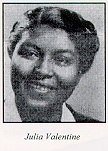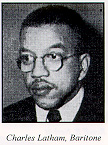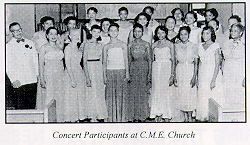|
Champaign County African American History Committee |
E-mail: |
Copyright © 1998 All rights reserved. |
Courtesy of: |
|
| SUMMER 1997 |


THE LEGATO MUSIC CLUB |
| By Hester Suggs
 Through the years many Black organizations have played vital roles in the history and preservation of culture in the local African American community. Some have been long term and are still currently in operation with well documented historical information as to their role, mission and vision in responding to societal development, i.e. NAACP, Urban League, local churches, Masonic groups, and affiliates. Others have been short term and their scope and longevity limited, but they too have served vital functions of historical significance to the Black Community. A look into the artifacts from these groups reveals all the rich historical chronology of those segments of the community. Examination of meeting minutes, news articles and announcements, programs, posters and flyers of events, scrapbook photos and notes, and individual memorabilia gave excellent historical information and leads to resource persons. The Legato Music Club was one of these "shorter term" organizations that provided positive experiences in the Black community during the 1940s. The Legato Music Club was formally organized in 1945. Prior to that time there were many evidences of interest in the arts. Nationally renowned Black artist, baritone Paul Robeson, contralto Naomi Watson, dramatic soprano Omega King, and the great Marian Anderson, world renowned "colored" contralto, gave performances in Champaign-Urbana. Classical Choirs and ensembles from Black colleges performed locally while on tour to raise funds. Local Black church choirs utilized hymns, anthems and spirituals in weekly worship services. On Sunday, July 23, 1944, the Twin City Committee presented a Negro Folk Song Festival under the direction of Julia Walden Valentine at 4:30 in Crystal Lake Park Pavilion. This program featured a community chorus, a female chorus, violinist Bruce Hayden, and vocal soloists Thelma Holloway, Hattie Winfield and Lucy Gray. From this group the Legato Music Club was initiated. Julia Valentine, musical director of Salem Baptist Church, classical pianist, and a graduate of the School of Music, Milliken University in Decatur, Illinois opened a music studio in her home where both vocal and instrumental lessons were given. Members interviewed credit Mrs. Valentine with forming the club in 1945. Its objective as given in a program, "The Legato Chorale Ensemble in Musique Soiree an Afternoon of Music" were:
Members were drawn from the diverse Black population in the community and included professionals and nonprofessionals - doctors, barbers, domestics, cooks, university students (there were no faculty members on campus), young and old, poor and middle-class (there were no rich). All were rich in their interest and involvement in the musical experiences provided. The club met on the third Monday of each month at the home of a member to discuss music and to study the various artists and their works and to present a musical program. Both local newspapers gave monthly coverage of not only special events, but also the monthly meetings. Other recitals, performances, programs and events such as the annual Mother Daughter Banquet were held for "the establishment of a scholarship fund for worthy music students." Benefit programs were presented to "aid the various churches in their drives." The club also sponsored a youth group, the Sharps and Flats, and the Junior Music Club, where the youth of the community were mentored in both classical and contemporary music and were exposed to Black history through music. They also learned the finer art and protocol needed to present professional programs to the community with dignity and elegance. Many local musicians received their first training and inspiration in the musical field training and inspiration in the musical field due to the efforts of the Legato Music Club. |
| Back to the top of the page | |





